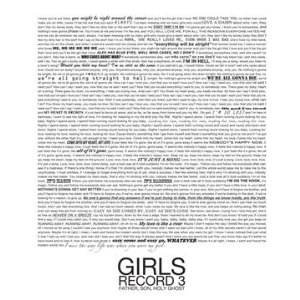Both of Girls’ records have been released in September, as summer wanes. This is appropriate, as the band – at its core a duo comprised of singer/songwriter Christopher Owens and bassist/producer Chet White – have a knack for capturing the bittersweet mood that abounds at this time of year. Father, Son, Holy Ghost, the successor to their acclaimed retro-pop opus Album, feels much weightier and more developed by comparison. However, while Girls have returned brimming with confidence and enthusiasm, this record seems to overstretch them.
The main criticisms of Album concerned its imitative qualities. But the duo’s shameless appropriation is their main strength, in a funny way. Owens possesses the rare ability to gambol through guitar pop’s sunny past – hopping nimbly from The Beatles to Jonathan Richman to melodramatic 60s teen-pop – while always managing to establish his own innocent but damaged identity. In a climate in which bands of this ilk openly delight in graverobbing, Girls’ thievery seems excusable, more an establishment of Owens’ personality than cynicism. Likewise, some might have scowled at Album‘s messy nature – it was clearly the result of recording sessions in various locations, with various drummers – but that patchwork nature brought a personal touch. Not only was Owens playing you his record collection, he’d let you into his bedroom as well.
That intimate element is largely missing from Father, Son, Holy Ghost. The record is polished, with a well-drilled line-up bringing a hitherto unheard musicality to proceedings. Immediately, the songs seem more complex, more proficient; where Owens once conversed with the listener using the most basic pop grammar, he now attempts to harness his trite lyricisms and sentiments onto big early 70s arrangements. The songs tend to be built on the stripped-down foundations that we’re used to, with Owens’ wispy, cracked vocals creating an atmosphere of fragile intimacy. But they frequently bloom into a wider sound, augmented by organs, flutes, gospel choirs and acid guitars, which smothers their charming naivety in all the trappings of early 70s decadence.
While the band are clearly having a wail of a time, they come dangerously close to drowning out what was so arresting about their music in the first place. Owens’ songwriting was bewitching because of his knack of taking a corny cliché and a simple structure and making something heartrending out of it – see Lust For Life, Laura, or Lauren Marie from the first record. Here he writes in a similarly childlike, Daniel Johnston-aping fashion, but welds his wide-eyed ditties to big psychedelic rock chasses. This comes at the expense of both the winning dark/naïve formula of the first record, and the molten power of his band. We’re distracted from Owens’ sweet, modest songwriting by the indulgent elements, while his whispery voice simply can’t command the gospel.
‘Die’ is a foray into a cross-pollination of Fleetwood Mac acid-riffing and gonzo stoner rock, which knocks the album off-kilter early on. It’s a successor to the first album’s rocker, ‘Big Bad Mean Motherfucker’, but it’s not something the band can pull off, let down by a flimsy vocal. ‘Vomit’, an early single, is marred by a leap off the beaten path into a limp echo of Rotary Connection-style psychedelic soul. ‘Forgiveness’, a foolhardy eight minute epic, is lost in backmasking, meandering guitars and various excesses that might scream ‘Too much drugs!’ Conversely, the naked ‘How Can I Say I Love You’ grates, taking the band’s trademark lyrical simplicity to toe-curling levels of banality.
That said, there’s plenty of evidence that the Girls we know and love are still here, even if they are frequently hidden under a drug bloat. ‘Honey Bunny’ with its rollicking surf beat sounds like a classic already, as does ‘Magic’, a rare instance in which the arrangement fits the song. There’s no failure on Chet White’s part – the sound is perfectly balanced, and has a bright retro-authenticity that would make Mark Ronson green with envy. It’s all well and good recruiting a fire-cracking bunch of musicians and doing a top drawer production job, but Girls have to find a balance between the waiflike simplicity they excel at and the lysergic rock & roll gospel they seem to enjoy. Owens has brought a psychedelic array of colour to the palette this time around, but has ended up with a brown canvas.


